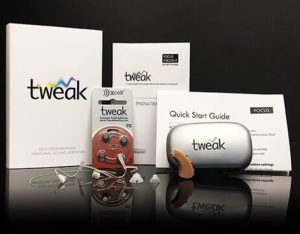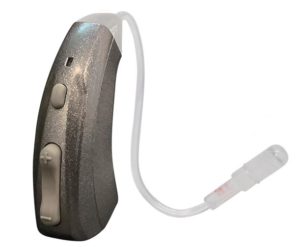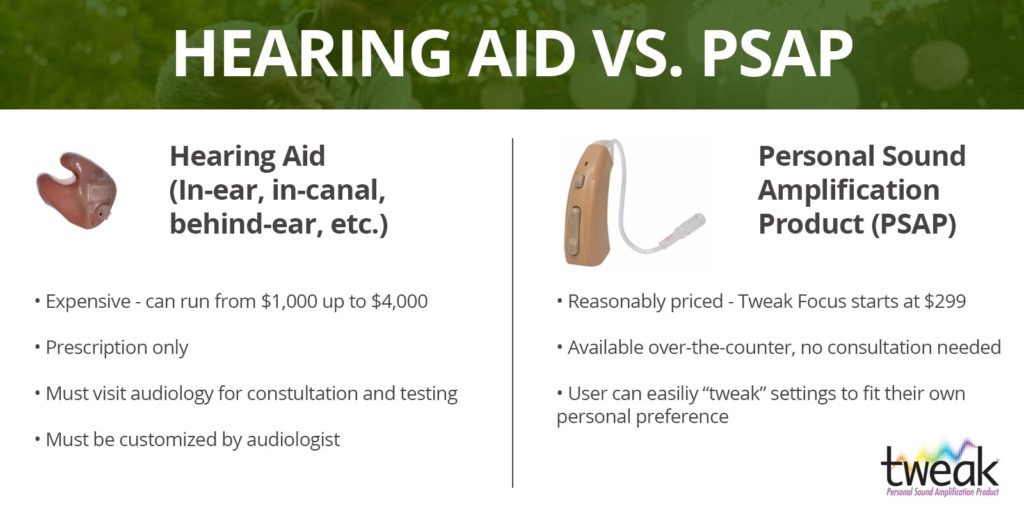If you are 65 or older, you have probably heard a lot about over-the-counter hearing amplifiers. These devices, known as Personal Sound Amplification Products (PSAPs) are often advertised as alternatives to costly hearing aids. But how do you know when you truly need a hearing amplifier / PSAP? In this article, we will walk you through some questions to help guide you to an answer. We will also arm you with crucial information to help you choose the right type of device – and learn to spot the junk!
Not all hearing sound amplifiers are created equally
Before we begin, it is important to make sure we are talking about the right kind of device. ‘Hearing Amplifier’ is a fairly common term, but the products available under this category vary widely. The cheaper products are typically low-grade amplifiers, ranging from toys to low-tech tools to help make your TV louder. There are also a class of hearing amplifiers that are quite high-tech. In fact – these devices have many of the same features and benefits as prescription hearing aids costing many times more. When we refer to hearing amplifiers or PSAPs in this article, we are referring to these advanced devices.

Hearing loss affects 1 in 3 adults over the age of 65.
Let’s start with your age
In determining whether or not you need a hearing amplifier, one of the first things to consider is your age. As we get older, gradual hearing loss is common. The National Institute of Health states that 1 in 3 adults over 65 suffer from hearing loss. For adults over 75, hearing loss affects nearly 50% of the population. Using this guideline is a natural place to start. If you are 65 or over, you automatically fall into a category that is highly likely to have some level of hearing loss. Now, let’s dig further and talk about some specific symptoms.
Signs you might need a personal hearing amplifier
- Difficulty hearing conversations – Do you find yourself straining to hear what people are saying in conversations? Does it seem like everyone mumbles and you just wish they would speak clearly? Difficulty hearing others speak is one of the first signs of hearing loss. That can be really confusing and frustrating to most, as they haven’t yet considered hearing loss as a problem. It just seems as though people need to speak up!
- Difficulty hearing in crowds – Sometimes hearing a conversation one on one is perfectly easy, but in a crowded room, you find it difficult to hear anything but the noise and chatter. This is another common symptom of hearing loss unfortunately. Many find that they have a hard time having a conversation in a restaurant, or in meetings. Hearing a speaker at church or any other event becomes difficult.
- Always turning up the television – Do you find yourself cranking up the TV or other devices in your home? If you are like most, family members will be quick to point out that you need to turn it down. If having the TV loud enough to hear is a constant struggle in your home, then you could be suffering from mild to moderate hearing loss.
- Missing calls and visitors – The sound of a phone ringing or the ding of a doorbell are in that range of frequencies that many with hearing loss have trouble hearing. If you find yourself missing calls on a regular basis, then hearing loss is definitely something to consider. Likewise, if you can’t hear your own doorbell and friends and family are wondering why you aren’t answering, you could certainly be looking at some loss of hearing.
- Missing the sounds of nature – If you have trouble hearing the birds chirping and the other sounds of nature you have always enjoyed, that is another common complaint from those suffering from hearing loss.
- You’ve been told – Last but not least, if you are having trouble hearing, you will likely have no shortage of people in your life telling you so! Perhaps a spouse, children, or close friends, but someone closest to you has probably noticed and has said something. If not – maybe they have noticed but didn’t want to bring it up. In that case, it never hurts to ask those closest to you if they have noticed any changes that would make them think your hearing is on the decline.
Putting the pieces together
Looking at the clues and signs above, and taking your age into consideration, what is your honest opinion of the likelihood you have suffered from some level of hearing loss? Mild to moderate hearing loss is a lot more common than most people think and given the percentages affected, it has to be seriously considered. If you’ve considered these things and have come to the conclusion that this describes you, then you could most certainly benefit from a PSAP.
Hearing Amplifier or Hearing Aid
A hearing amplifier / PSAP is available over the counter and is designed to work with a broad range of patients. A hearing aid, on the other hand, is a prescribed medical device, only available after consultation and extensive testing from an audiologist. Hearing aids fit by an audiologist are customized for different frequencies, and now some of the more advanced PSAPs (such as Tweak) can also be customized by the user. Often, this can be better than the adjustment made by an audiologist because the user is “tweaking” the amplifer based on his/her listening preference.[/vc_column_text][vc_column_text css=”.vc_custom_1501253064035{border-top-width: 1px !important;border-right-width: 1px !important;border-bottom-width: 1px !important;border-left-width: 1px !important;padding-top: 20px !important;padding-right: 20px !important;padding-bottom: 20px !important;padding-left: 20px !important;background-color: #d2e6f2 !important;border-left-color: #1e73be !important;border-left-style: solid !important;border-right-color: #1e73be !important;border-right-style: solid !important;border-top-color: #1e73be !important;border-top-style: solid !important;border-bottom-color: #1e73be !important;border-bottom-style: solid !important;border-radius: 10px !important;}”]Note: There are certain conditions where it is imperative that you see an audiologist and get their expert recommendation. In fact, if you suffer from any of these symptoms, you should make an appointment immediately, and do not attempt to buy your own PSAP. These symptoms include:
- Bleeding or drainage from either ear
- Hearing loss associated with a head injury or trauma
- Sudden and dramatic hearing loss
- Pain or feeling of pressure in the ears
- Problems maintaining your balance
- Any hearing loss that comes and goes / fluctuates
- Different levels of hearing loss in each ear
- Ringing in only one ear
Choosing the right personal hearing amplifier
There are many factors to consider when choosing the hearing amplifier that is right for you, and we will cover those in another article. For now, the main thing to look out for is flexibility. We mentioned above that prescribed hearing aids are custom programmed to cover the specific loss of each patient, and likewise, a good PSAP offers flexibility in its range of amplification. Make sure the device allows you to control how it amplifies the sound to best fit your needs. Also make sure the device has setting for different situations – such as noisy rooms, or even quiet spaces.

The Tweak Focus comes in two models to best suit your needs.
Introducing the Tweak Focus and Focus-T
One such device that meets these specifications is the new Tweak Focus and Focus-T hearing amplifiers / PSAPS. These devices are designed and manufactured by an audiologist who has squeezed his decades of experience into these tiny little devices. Each model is equipped with the same features and technology found in most hearing aids – but at a price that makes them easy to get. Selectable amplification profiles, noise and quiet modes, front and rear microphones, and a user-friendly interface are some top features of the Tweak. You can find out more about these models by clicking here.
Don’t put off doing something about hearing loss
We hope this article helps you in determining whether you might suffer from mild to moderate hearing loss. Above all, remember that you are not alone. Hearing loss affects 30-50% of the population over the age of 65. Waiting to do something about it only leads to more issues, and unfortunately, can also lead to feelings of isolation and even depression. You could be missing a lot of great things in your life because you aren’t hearing them.



